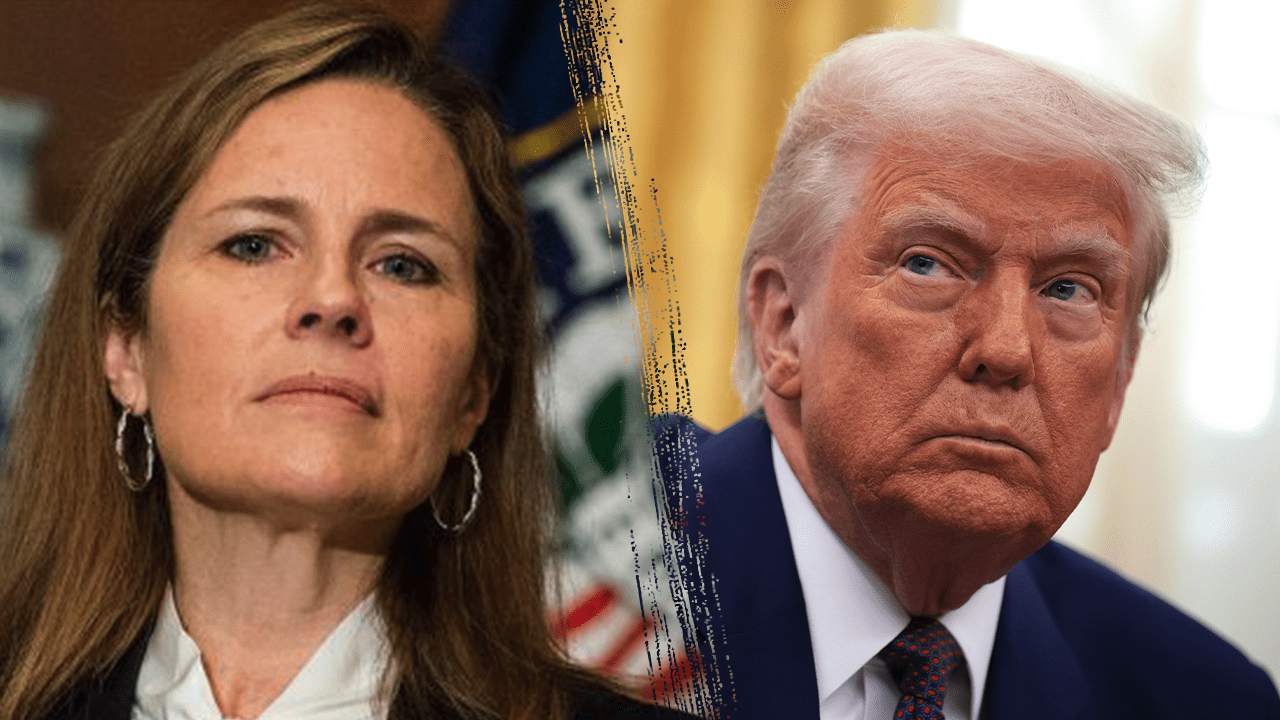INTERNACIONAL
Trump appointee Barrett challenges administration on nationwide injunctions, surprises and delights liberals

Supreme Court Justice Amy Coney Barrett sparred with U.S. Solicitor General John Sauer Thursday, pressing him on whether the Trump administration would follow federal court precedent. The exchange quickly became one of the day’s most talked-about moments and could reignite criticism of Barrett from Trump allies.
The back-and-forth took place Thursday during oral arguments in a case related to President Donald Trump’s effort to end birthright citizenship with a specific focus on whether lower courts should be able to block executive actions from taking effect nationwide.
Justice Barrett, a Trump appointee, grilled Sauer about the administration’s stance toward lower court rulings, which followed similar lines of inquiry from her colleagues on the bench.
«I want to ask you about a potential tension,» she began, before stopping to correct herself. «Well, no, not a potential tension, an actual tension that I see in answers that you gave to Justice Kavanaugh and Justice Kagan.»
JUSTICE KAGAN SNAPS AT TRUMP LAWYER IN MAJOR CASE: ‘EVERY COURT HAS RULED AGAINST YOU’
President Donald Trump, alongside Treasury Secretary Scott Bessent, left, and Secretary of Commerce nominee Howard Lutnick, right, speaks to reporters as he signs an executive order to create a U.S. sovereign wealth fund in the Oval Office of the White House Feb. 3, 2025, in Washington, D.C. (Jim Watson/AFP via Getty Images)
Barrett then asked Sauer if the Trump administration «wanted to reserve its right to maybe not follow a Second Circuit precedent, say, in New York, because you might disagree with its opinion?»
«You resisted Justice Kagan when she asked you whether the government would obey» such a precedent, she said.
Sauer responded, «Our general practice is to respect those precedents. But there are circumstances when it is not a categorical practice, and that is not …»
Barrett interrupted, asking if that is the Trump administration’s practice or «the long-standing practice of the federal government?»
Sauer replied that it is «the long-standing policy of the Department of Justice.»
«Really?» she asked.
SUPREME COURT TAKES ON BIRTHRIGHT CITIZENSHIP: JUSTICES SEEMINGLY SPLIT ON LOWER COURT POWERS
«Yes, as it was phrased to me, we generally respect circuit precedent, but not necessarily in every case,» Sauer said. «Some examples might be a situation where we are litigating to get that circuit precedent overruled and so on,» he added later.
«That’s not what I’m talking about. I’m talking about this week,» Barrett stressed, pointing to the Second Circuit Court of Appeals’ ruling that Trump’s birthright citizenship order is unconstitutional.
«And what do you do the next day, or the next week?» she asked.
«Generally, we follow this,» Sauer said, which provoked a somewhat incredulous response from the justice.
«So, you’re still saying generally?» she asked him. «And you still think that it’s generally the long-standing policy of the federal government to take that approach?»

Protesters demonstrating against President Donald Trump’s during the early months of his second presidential term, and President Donald Trump signing an executive order at the White House. The Supreme Court will hear oral arguments Thursday, May 15, on a case involving Trump’s birthright citizenship executive orders. (Getty Images)
The remarks sparked divided political reactions on social media, with Democratic strategist Max Burns noting, «Trump Solicitor General D. John Sauer tells Justice Amy Coney Barrett that Trump ‘generally’ tries to respect federal court decisions but he has the ‘right’ to disregard legal opinions he personally disagrees with. Coney Barrett seems to be in disbelief.»
«John Sauer just said the quiet part out loud: unless the Supreme Court tells them directly, Trump’s team might ignore lower court rulings,» said Seth Taylor, a 2024 DNC delegate. «That’s not governance – that’s constitutional brinksmanship.»
«Amy Coney Barrett (ACB) is proving once again she may the the worst SCOTUS pick ever by a Republican,» conservative commentator and podcast host Cash Loren said on social media.
«She has a lifetime appointment to the Supreme Court. … Yet you can hear her disdain for the Trump administration.»
100 DAYS OF INJUNCTIONS, TRIALS AND ‘TEFLON DON’: TRUMP SECOND TERM MEETS ITS BIGGEST TESTS IN COURT

Demonstrators hold up signs during a protest against President Donald Trump at the Washington Monument in Washington April 5, 2025. (AP Photo/Jose Luis Magana)
Earlier this year, Barrett sided with three of the Supreme Court’s liberal justices and Chief Justice John Roberts in rejecting, 5-4, the Trump administration’s request to block billions in USAID money for previously completed projects.
The decision sparked fierce criticism from Trump supporters, who have attempted to label Justice Barrett an «activist» justice and someone who has been insufficiently loyal to the president who tapped her for the high court.
Others have pointed out her track record as a reliably conservative voter and the fact the court has lifetime appointments to allow justices to ostensibly act without undue political interference.
Trump later said he had no knowledge of the attacks against her, telling reporters, «She’s a very good woman.»
«She’s very smart, and I don’t know about people attacking her. I really don’t know.» Trump added.
The court ruling could come in a matter of days or weeks. But it will likely hinge closely on the votes of two Trump appointees, Justice Neil Gorsuch and Justice Barrett, George Washington University law professor Jonathan Turley told Fox News Friday.
Overall, he said of the hearing, «it got pretty sporty in there.»
CLICK HERE TO GET THE FOX NEWS APP
«There were some lively moments, at least lively for the Supreme Court,» he said, before noting the justices to watch are Gorsuch and Barrett.
«Justice Barrett is probably the greatest concern right now for the Trump administration,» Turley said.
Donald Trump,Supreme Court,Federal Courts,Politics,Judiciary
INTERNACIONAL
Portland mayor demands ICE leave city after federal agents use tear gas on protesters ‘Sickening decisions’

NEWYou can now listen to Fox News articles!
The mayor of Portland, Oregon, is calling on U.S. Immigration and Customs Enforcement (ICE) to leave his city after federal agents deployed tear gas at a crowd of demonstrators, including young children, outside an ICE facility over the weekend.
Mayor Keith Wilson characterized the protests on Saturday as peaceful, as federal agents reportedly used tear gas, pepper balls, flash-bang grenades and rubber bullets against the anti-ICE demonstrators.
Wilson urged ICE agents to resign and for the agency to leave Portland, denouncing their «use of violence» and the «trampling of the Constitution.»
«Today, federal forces deployed heavy waves of chemical munitions, impacting a peaceful daytime protest where the vast majority of those present violated no laws, made no threat, and posed no danger to federal forces,» he said in a statement on Saturday.
CHICAGO MAYOR BRANDON JOHNSON PUTS ICE ‘ON NOTICE’ WITH EXECUTIVE ORDER SEEKING PROSECUTION OF AGENTS
Mayor Keith Wilson characterized the protests in his city as peaceful, as he called for ICE to leave. (Ali Gradischer/Getty Images)
«To those who continue to work for ICE: Resign. To those who control this facility: Leave. Through your use of violence and the trampling of the Constitution, you have lost all legitimacy and replaced it with shame. To those who continue to make these sickening decisions, go home, look in a mirror, and ask yourselves why you have gassed children. Ask yourselves why you continue to work for an agency responsible for murders on American streets. No one is forcing you to lie to yourself, even as your bosses continue to lie to the American people,» the mayor continued.
The mayor added that this nation «will never accept a federal presence where agents wield deadly force against the very people they are sworn to serve.»
«I share the impatience with those who demand we use every legal tool at our disposal to push back against this inexcusable, unconscionable, and unacceptable violence against our community,» Wilson said. «I share the need to act. Actions that can withstand the scrutiny of the justice system take time – and we cannot afford to lose this fight.»
CBP/BORDER PATROL AGENTS PLACED ON ADMINISTRATIVE LEAVE AFTER DEADLY CONFRONTATION WITH ALEX PRETTI

Federal agents deployed tear gas at a crowd of demonstrators, including young children, outside an ICE facility in Portland. (Victor J. Blue/Bloomberg via Getty Images)
Portland officials are working to operationalize an ordinance, which went into effect last month, that imposes a fee on detention facilities that use chemical agents, the mayor said.
«As we prepare to put that law into action, we are also documenting today’s events and preserving evidence. The federal government must, and will, be held accountable,» he wrote.
«Portland will continue to stand firmly with our immigrant neighbors, who deserve safety, dignity, and the full protection of the communities they help build,» he continued. «We are also proud of the Portlanders who showed up today in peaceful solidarity, demonstrating the strength and clarity of those shared values in the face of federal overreach.»
This comes amid national unrest and bipartisan scrutiny of immigration enforcement tactics following two killings of U.S. citizens by federal immigration agents last month in Minneapolis.

The Trump administration has faced bipartisan scrutiny over its immigration enforcement tactics following two killings of U.S. citizens by federal immigration agents in Minneapolis. (Demetrius Freeman/The Washington Post via Getty Images)
CLICK HERE TO DOWNLOAD THE FOX NEWS APP
Renee Nicole Good was shot and killed by ICE agent Jonathan Ross on Jan. 7 in Minneapolis, and Alex Pretti was fatally shot on Jan. 24 by Border Patrol agent Jesus Ochoa and Customs and Border Protection officer Raymundo Gutierrez while he was recording immigration enforcement operations in the same city.
Pretti, an ICU nurse, appeared to be attempting to assist a woman agents had knocked down when he was sprayed with an irritant, pushed to the ground and beaten, according to video and witness accounts. An agent was later seen pulling Pretti’s lawfully owned firearm from his waistband before other agents fired several shots, killing him.
portland,oregon,us,donald trump,homeland security,kristi noem,us protests
INTERNACIONAL
“As Nasty As They Wanna Be”: qué hay detrás del álbum más censurado en la historia del rap

En 1990, la industria musical de Estados Unidos vivió un hecho inédito: por primera vez, un álbum fue declarado “legalmente obsceno”. El protagonista de este episodio fue 2 Live Crew, un grupo de rap originario de Miami, cuyo tercer disco, As Nasty As They Wanna Be, no solo desató controversia por su contenido, sino que también reconfiguró los límites entre arte, moral y legalidad.
Formado en la década de los 80, 2 Live Crew se caracterizaba por sus letras explícitas, ritmos acelerados y una actitud desafiante que rompía con los códigos de la época. El grupo, liderado por Luther Campbell (conocido como Luke Skyywalker), ya era un referente del subgénero Miami bass, pero no fue hasta el lanzamiento de As Nasty As They Wanna Be, el 7 de febrero de 1989, que se convirtieron en un fenómeno nacional.
El disco, repleto de referencias sexuales y lenguaje explícito, fue el mayor éxito comercial de la banda y obtuvo la certificación de platino de la Recording Industry Association of America (RIAA).
La polémica que rodeó el álbum terminó de definir su lugar en la historia. “Con letras explícitas, ritmos provocadores y una actitud desfachatada, 2 Live Crew se metió directo en el ojo de la tormenta cultural”, señaló Indie Hoy.
La llegada al mercado de As Nasty As They Wanna Be coincidió con una creciente preocupación social e institucional por el contenido de la música popular, en especial el rap, que para muchos sectores conservadores representaba una amenaza para los valores tradicionales.
La controversia alcanzó su punto máximo en 1990, cuando un tribunal del distrito de Florida declaró a As Nasty As They Wanna Be como “legalmente obsceno”, un fallo sin precedentes en la historia de la música estadounidense. El disco, que ya incluía el clásico sello de advertencia parental, pasó a ser el primer álbum en recibir tal calificación jurídica.
Según el fallo, el contenido de las canciones era tan explícito que excedía los límites de la libertad artística y podía ser considerado un delito.
Dos días después de la sentencia, un vendedor de discos de Florida fue arrestado por vender una copia del álbum a un policía encubierto. “La detención convirtió a 2 Live Crew en leyenda. No por romper récords de ventas, sino por entrar a los libros de historia como los primeros músicos en ser procesados por el contenido lírico de su obra”, destacó Indie Hoy.
El impacto del proceso judicial fue inmediato. Figuras públicas, como David Bowie, manifestaron su apoyo a la libertad de expresión artística. Incluso académicos de renombre, como Henry Louis Gates Jr., testificaron a favor del grupo durante el juicio.
Este episodio no solo consolidó la fama de 2 Live Crew, sino que también abrió un debate sobre el papel del Estado frente a las expresiones culturales consideradas ofensivas o disruptivas.

El juicio contra 2 Live Crew no solo marcó un antes y un después en la industria del rap, sino que también sentó un precedente legal de alcance duradero. El disco, que representó el final de la relación del grupo con el sello Skyywalker Records —renombrado luego como Luke Records tras una demanda de George Lucas por el uso del nombre—, pasó a ser un símbolo de la lucha por la libertad artística en Estados Unidos.
La controversia en torno a As Nasty As They Wanna Be se inscribió en una larga tradición de enfrentamientos entre músicos y el sistema judicial. Casos como el arresto de Jim Morrison en 1969 en Miami por “exposición indecente”, el hostigamiento sufrido por Billie Holiday por interpretar “Strange Fruit” o la persecución política contra Fela Kuti en Nigeria por sus letras contestatarias muestran que el arte musical ha sido históricamente terreno de disputa y resistencia.
A pesar de la censura inicial y los problemas legales, el álbum de 2 Live Crew resistió el paso del tiempo como un recordatorio de los riesgos y desafíos que implica empujar los límites del discurso público. “Más allá del debate sobre el tono de sus letras, lo cierto es que su caso marcó un antes y un después en la relación entre música y legalidad”, concluyó Indie Hoy.
As Nasty As They Wanna Be no solo fue un éxito comercial, sino que se transformó en un punto de inflexión en la discusión sobre los límites de la libertad artística y la intervención estatal.
INTERNACIONAL
Quién es Laura Fernández, la Bukele de Costa Rica que arrasó en las elecciones y será la próxima presidenta

La “heredera” de Rodrigo Chaves
Atacar la inseguridad y el narcotráfico, el principal objetivo

 CLIMA NOTICIAS3 días ago
CLIMA NOTICIAS3 días agoA qué hora puede llover hoy en CABA, según el Servicio Meteorológico Nacional

 CHIMENTOS3 días ago
CHIMENTOS3 días agoJulieta Díaz contó por qué no funcionó su noviazgo con Luciano Castro en medio de la separación con Griselda Siciliani

 POLITICA3 días ago
POLITICA3 días agoEl New York Times asegura que la Argentina podría firmar un acuerdo con EE.UU. para recibir deportados



























